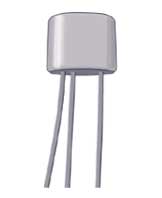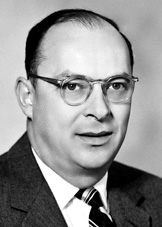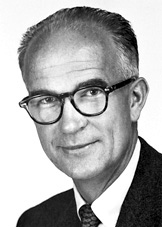|

(See “Update: Fact-Checker Insomnia,” May 5, 2008)

April 21, 2008
The birth date of some influential baby boomer? Some momentous Atomic Age treaty?
Nope. But it was a date that utterly transformed our lives. It was the birth date of that on which our whole vast technological culture balances, like a billion angels on the head of a pin: the transistor—“a little electronic switch capable of amplifying electric current.”
As you’ll read at that fascinating link, the first transistor was cobbled together at Bell Labs out of ingredients that included a paper clip. (Here’s the dramatic story —science as it happens! Oops, no paper clip in this more detailed story. Urban legend? Now you know what fact checkers are up against.) It boosted electrical current a hundredfold. Its creators, John Bardeen, Walter Brattain and William Shockley, won the Nobel Prize in physics nine years later.
The solid-state transistor swiftly edged out the vacuum tube, its finicky predecessor, and went on transform the world, growing ever smaller, mightier, and more numerous:
Today, the most complex silicon chips [the size of a human fingernail] can carry more than 1 billion transistors each—and we manufacture billions of new chips each year. It’s nearly impossible to comprehend the numbers. Each year we manufacture about 10 million times as many transistors as there are estimated stars in the Milky Way.
As Michio Kaku writes in April’s featured story, “Invisibility,” the transistor is, incredibly, poised to conquer still further frontiers of tininess and mightiness (and coolness, since the heat silicon chips generate presents a significant cost and challenge). Light transistors, using photonic crystal technology, and plasmonics, which involves transferring vast amounts of information from light waves to much tinier electron wavelengths (don’t quote me), are the next frontiers, and they both will require nanotechnology to etch pathways at atomic scales.
It makes the good old transistor, as in the transistor radio those of us old as the transistor used to press to our ears at the beach (the Neanderthal iPod), almost an object of nostalgia. Here’s more. Some of you will understand this much better than I do, but without ever really quite understanding it, I have to say it has boosted my awe quotient and appreciation for the concentrated thought packed into my life’s conveniences (and accompanying annoyances).


(Annie Gottlieb) |
Comments (add yours!)

Return to April home
|






